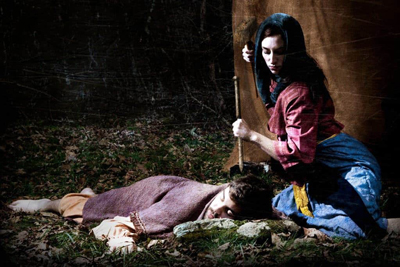
Depicted in the Book of Judges, Jael or Yael is a fairly controversial figure from the Old Testament, a heroine of the Battle of Tabor against King Jabin of Canaa, as well as the assassin of Sisera, the military leader of the Canaanite chariots. She was a heroine for playing an important role in defeating Israel’s enemy, but she committed an act of treachery and deceived Sisera by breaking the cultural and social norms, which is a breach of all laws of hospitality.
Her story has always been controversial, mainly due to her violation of the cultural rules of sanctuary.

Although Jael has often been understood to be the wife of Heber the Kenite, it may also mean a woman of the group of the Kenites, a nomadic tribe, some of whom lived in close proximity to the Israelites.
Nevertheless, according to the Book of Judges, Heber the Kenite was a descendant of Jethro, a Kenite shepherd and priest of Midianite, as well as the father-in-law of Moses, who had separated himself from the other Kenites, along with his wife and pitched their tent in the plain of Zaanaim, located near Kedesh, within the territory of the Naphtali tribes of Israel.

The story says, Deborah, a prophetess of God and the fourth Judge and only female Judge mentioned in the Hebrew Bible, advised Barak, a ruler of Ancient Israel, to deploy the tribes of Naphtali and Zebulan, one of the twelve tribes of Israel, on Mount Tabor, for fighting against King Jabin of Canaan. Barak reluctantly agreed, provided if she agrees to accompany. Deborah agreed to his proposal on the condition that, the honour of defeating Jabin's army would go to a woman. Finally, Jabin's army, led by Sisera faced the enemy force on the Plain of Esdraelon, where during the action, Sisera's iron-bound chariots became restrained by the mud caused by a heavy downpour during the night before, resulting in the River Kishon to overflow its banks.
Apprehending an imminent and disastrous defeat, Sisera was forced to flee, instead of dying with his men on the battlefield and ran to the tent of Heber for shelter, on the plain of Zaanaim. He was aware that Heber and his household were at peace with Jabin, the king of Canaan, because the Kenites were metalworkers and most likely they provided the necessary service for making and repairing weapons.

However, Heber’s wife Jael was sympathetic with the Israelites because of the twenty-year period of harsh oppression inflicted on them by Jabin. In spite of that, she welcomed Sisera into her tent, in the absence of her husband, covered him with a soft blanket and when Sisera asked Jael for a drink of water; she gave him milk instead. After that, he instructed her to guard the entrance, before he fell asleep, exhausted from the battle. But Yael took advantage of the situation and hammered a tent peg into Sisera’s skull with the help of a mallet, fulfilling the prophecy of Deborah. Jael knew that Sisera would be killed if captured, so she killed him to cement a friendship with the victor and showed his dead body to Barak, who later came in pursuit of the enemy general.


Although Jael allegedly committed the crime of murdering Sisera by breaking the cultural and social norms, but it is also argued that, Jael was aware that Sisera was in flight, while Barak was in his pursuit and Sisera would be killed if captured. Under the circumstances, it would not have been wise to allow Barak to find Sisera in her tent. Therefore, she would kill him and thus cement a friendship with the victor. Nevertheless, the Biblical commentaries have viewed Jael as either a heroine or someone much less so, but the Bible itself has nothing but praise for Jael, called most blessed of women in the Song of Debora.
